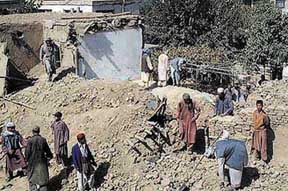Sunday noon our time, American and British forces parted with secrecy and hurled 50 Tomahawk cruise missiles into night-time Afghanistan. Targets included the Taliban’s military headquarters, aircraft and radar installations, and Al Qaida training camps. Among the casulaties were four civilian workers whose office was located near a Taliban communications tower.In tandem with the bombings, President George Bush has added millions of dollars to the original humanitarian aid to Afghanistan. “The United States of America,” said Bush in his address, “is a friend to the Afghan people.” Previously, Bush said the funding was “for more food, more medicine, to help the innocent people of Afghanistan deal with the coming winter.” As a result of the bombings, the increased aid will directly assist Afghans displaced from their homes in Kabul and Kandahar.
Several hundred thousand Afghani civilians have fled their homes in Kabul since 15 bombers and 25 strike aircraft streaked the night sky. Kabul’s electricity was struck Sunday. Since then, the bombing has continued through the week.
There is speculation as to crushing of the Taliban, which refused to bring Osama bin Laden, suspect in World Trade Center and Pentagon bombings, to trial except in one of their courts. “It’s unlikely that the airstrikes will rock the Taliban back on their heels,” said Defense Secretary Donald H. Rumsfeld Monday during the second day of bombing.
“They do not have high-value targets or assets that are the kinds of things that would lend themselves to substantial damage from the air.”
Americans and Afghans alike have been concerned that the bombings may be endangering civilians. Fear and hope mingle in Little Kabul, California, the center of one of America’s largest Afghan communities and named after Afghanistan’s capital and target of the bombings. Fear for relatives in Afghanistan is combined with hope that Osama bin Laden will be defeated.
One resident said, “I love democracy. I love freedom of speech. I love freedom of movement,” he said. “They are against that, against freedom for women. That’s why 6 million Afghans are outside of the country.”
Nevertheless, Afghans in Little Kabul, CA, fear for weaker relatives that could not leave Afghanistan and remain in Kabul.
The Taliban’s ambassador to Pakistan, Abdul Salam Zaeef, declared the air strike to be a “terrorist act against the Afghan nation.”
“America will never achieve its political goals by launching bestial attacks on the Muslim people of Afghanistan,” said Zaeef.
Sentiment at Guilford on Sunday reflected fear of retaliation in addition to fear for the Afghan people. Guilford sophomore Melissa Taylor’s biggest fear is “more attacks on the U.S., which could spark a much larger war.”
“The way the U.S. presents their plan, they’re going to go in there and cut off the terrorists, and then it will all be over, which is the ideal scenario,” said Taylor. “But technically bin Laden and the Taliban have the resources to strike us back again, and there could be biological warfare, and this mission could turn into something really scary.”
Possible terrorism has been investigated in anthrax poisoning in a Florida tabloid office. Various threats to national security have contributed to the FBI’s arrests of 600 suspects in America.

